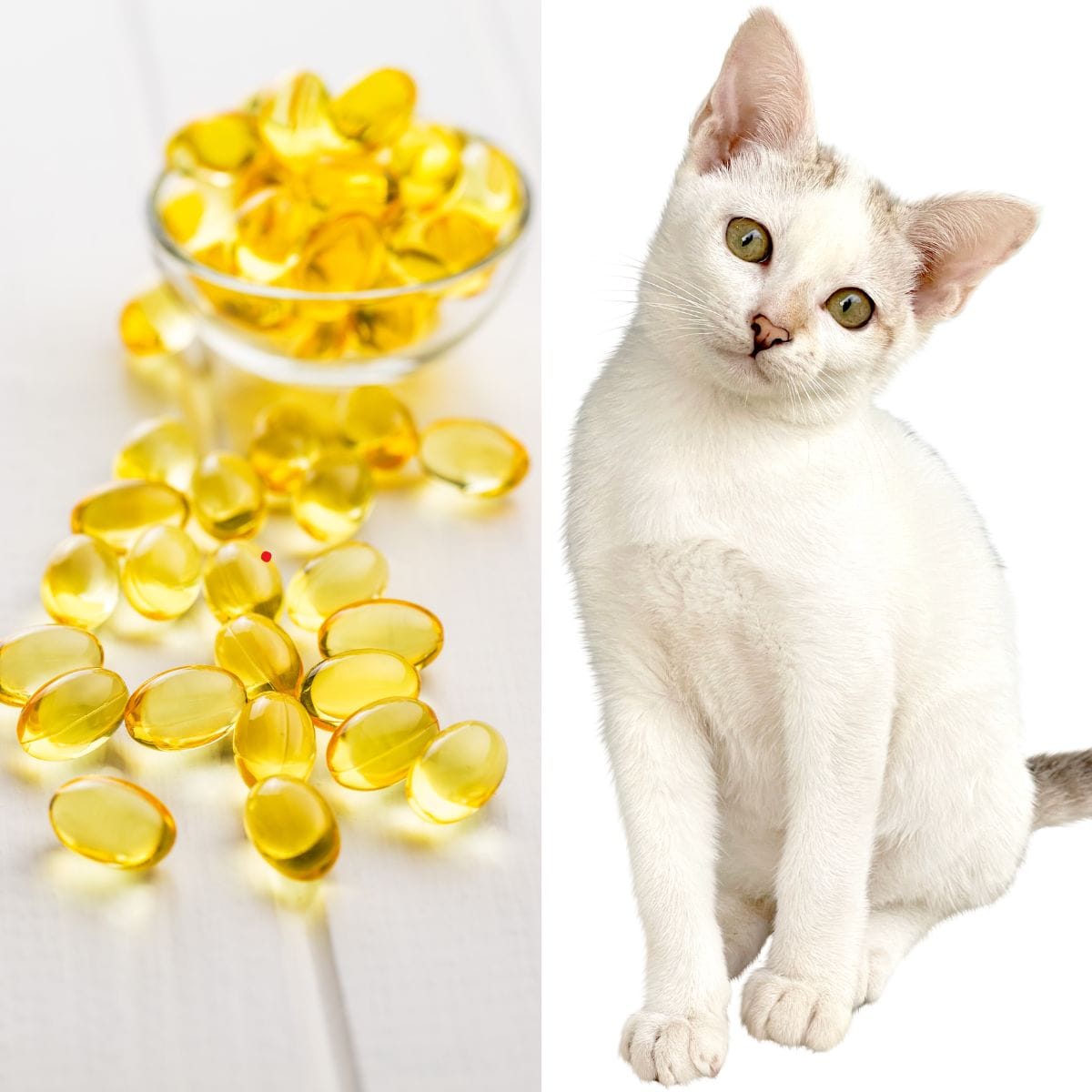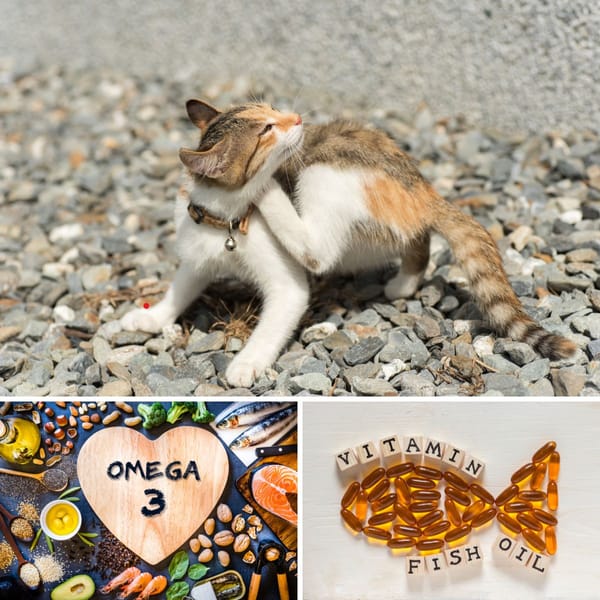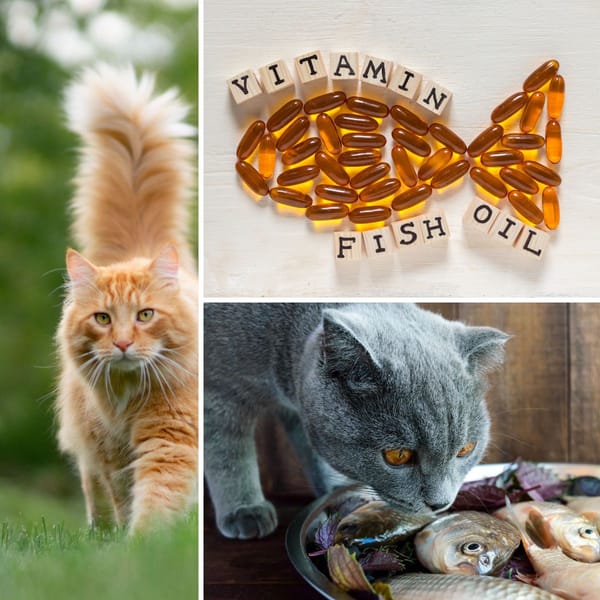Omega-3 fatty acids, commonly found in fish oil, are often touted for their myriad of health benefits for both humans and our feline friends. As pet parents increasingly turn to dietary supplements to enhance their cat's diet, it's crucial to understand not just the advantages but also the potential side effects of omega-3 fish oil in cats.
Key Takeaways:
- Omega-3 fish oil can offer health benefits for cats, including improved skin and coat health, joint health, and cognitive function.
- Potential side effects of fish oil in cats include gastrointestinal upset, weight gain, and blood clotting issues.
- Consultation with a veterinarian is essential before starting a fish oil regimen to ensure the correct dosage and to monitor for any adverse reactions.
Fish oil supplements are a popular choice among pet owners looking to boost their cat's overall health. They are a natural source of essential fatty acids like eicosapentaenoic acid (EPA) and docosahexaenoic acid (DHA), which are known to support skin health, reduce inflammation, and improve cognitive function. However, it's important to recognize that introducing any supplement, including fish oil, into your cat's system can come with potential side effects.
Understanding Omega-3 Fatty Acids in Cats
Omega-3 fatty acids are vital for maintaining a cat's skin and coat health, brain development, and cardiovascular health. These essential fatty acids cannot be produced by the cat's body and must be obtained through their diet. Fish oils, derived from coldwater fish, are an excellent source of these nutrients.
However, it's essential to know how much fish oil to give to your cat. High doses can lead to health conditions such as blood clotting issues and delayed wound healing. Therefore, it's crucial to follow a vet-recommended fish oil regimen to avoid any serious side effects.
The Benefits of Fish Oil for Cats
Fish oil for cats can offer many benefits, including improving skin conditions like flaky skin, enhancing joint health, and even helping to decrease triglyceride levels. Research shows that omega-3s can also reduce inflammation, which is beneficial for cats with inflammatory conditions or allergies.
Moreover, fish oils have been linked to improved cognitive function, which can be particularly beneficial for senior cats that may be experiencing cognitive decline. By incorporating fish oil into a cat's food, many owners have noticed an improvement in their pet's overall health during their golden years.
Potential Side Effects of Fish Oil
While the health benefits of fish oil can be significant, it's important to be aware of the potential side effects. Some cats may experience gastrointestinal upset, such as diarrhea or vomiting, especially if given fish oil on an empty stomach. To minimize this risk, it's best to mix fish oil with wet food.
Weight gain is another concern, as fish oil is high in calories. Pet owners should adjust their cat's diet accordingly to prevent obesity, which can exacerbate joint pain and lead to other health issues like heart disease and diabetes.
Fish Oil Dosage for Cats
Determining the correct dosage of fish oil for most cats is critical. Too little may not provide the desired health effects, while too much can lead to the aforementioned side effects. A veterinarian can help calculate how much fish oil is appropriate based on the cat's weight, age, and health status.
It's also important to note that fish oil supplements should be introduced gradually into a cat's diet to allow their system to adjust and to monitor for any adverse reactions.
Fish Oil and Kidney Disease
Cats with kidney disease require special dietary considerations. While omega-3 fatty acids can offer benefits, such as reducing inflammation in the kidneys, they should be used with caution. Pet parents should consult with a veterinary professional before adding fish oil to the diet of a cat with kidney disease.
Omega-3's Role in Brain Health for Cats
Omega-3 fatty acids are not just beneficial for a cat's coat and skin; they play a crucial role in brain health as well. In felines, especially older cats, omega-3s can help maintain cognitive function and potentially slow down the progression of age-related conditions. Studies in veterinary medicine have shown that a diet rich in omega-3s can lead to improved learning abilities in kittens and better memory retention in senior cats. This is because these fatty acids are essential components of nerve cell membranes, supporting normal brain function.
However, it's important to balance the intake of omega-3s as excessive amounts can lead to what are the side effects of omega fish oil in cats, such as a fishy odor or loose stools. When introducing omega-3 supplements to your cat's diet, start with a small dose and monitor your cat's system for any changes. Consulting with a veterinarian can help determine the optimal amount of omega-3s for your cat's brain health, ensuring they reap the cognitive benefits without the unwanted side effects.
The Impact of Omega-3s on a Cat's Skin and Coat
A shiny coat and healthy skin are telltale signs of a well-nourished cat, and omega-3 fatty acids play a significant role in achieving this. By incorporating fish oil into your cat's diet, you're providing essential nutrients that help reduce inflammation and nourish the skin from within. Many cats suffer from dry, flaky skin or a dull coat, but with the right amount of omega-3s, these issues can often be alleviated. The anti-inflammatory properties of omega-3s can also aid in the treatment of allergic skin conditions, promoting a smoother, more lustrous coat.
However, it's crucial to be aware of the potential side effects. Some cats may experience an adverse reaction to fish oil supplements, leading to cat's skin issues such as itchiness or rashes. To prevent these complications, it's advisable to introduce fish oil gradually into your cat's food and observe their reaction over time. If any negative symptoms persist, it's essential to consult with a veterinarian to adjust the dosage or explore alternative options for maintaining your cat's skin and coat health.
Fish Oil and Skin Allergies
For cats with skin allergies, fish oil can be a double-edged sword. While it can help improve the condition of a cat's skin and coat, some cats may actually develop allergies to fish oil itself. It's essential to observe your cat closely for any signs of skin irritation or allergic reactions when starting a fish oil supplement.
Fish Oil and Blood Clotting
One of the more serious side effects of fish oil in cats is its impact on blood clotting. Omega-3 fatty acids can decrease blood clotting, which can be dangerous for cats that are prone to bleeding disorders or are scheduled for surgery. Always inform your veterinarian if your cat is taking fish oil before any surgical procedures.
Fish Oil and Heavy Metal Toxicity
Fish oil, especially if sourced from marine sources that are contaminated, can carry the risk of heavy metal toxicity. It's vital to choose high-quality fish oil supplements that have been tested for purity to avoid exposing your cat to harmful substances like mercury.
Choosing the Right Fish Oil Supplement
With so many fish oil supplements on the market, it can be overwhelming for pet owners to choose the right one. Look for products that are specifically formulated for cats and that list EPA and DHA concentrations. Additionally, reputable brands will often provide information about their sourcing and manufacturing processes.
Incorporating Fish Oil into Your Cat's Diet
When adding fish oil to your cat's diet, it's best to mix it with their regular food to improve palatability and ensure it's consumed entirely. Some cats may be put off by the fishy odor, so starting with small amounts and gradually increasing the dosage can help them get used to the taste.
Monitoring Your Cat's Response to Fish Oil
After starting a fish oil regimen, it's important to monitor your cat for any changes in behavior, appetite, or physical condition. If you notice any adverse effects, such as increased itching, gastrointestinal issues, or lethargy, consult your veterinarian immediately.
Summary
Fish oil supplements can be a valuable addition to your feline friend's diet, offering benefits for skin and coat health, joint mobility, and cognitive function. However, it's essential to be aware of the potential side effects, such as gastrointestinal upset, weight gain, and blood clotting issues. Always consult with a veterinarian before starting your cat on fish oil and choose high-quality supplements to ensure safety and efficacy.
FAQ Section
Q: Can fish oil supplements be harmful to cats? A: While fish oil can offer numerous health benefits, it can also cause side effects such as gastrointestinal upset, weight gain, and blood clotting issues if not administered correctly. It's important to consult with a veterinarian before starting any new supplement regimen.
Q: How do I know if my cat is getting too much fish oil? A: Signs that your cat may be getting too much fish oil include diarrhea, vomiting, weight gain, and a fishy odor on their breath or skin. If you notice any of these symptoms, consult your veterinarian for advice on adjusting the dosage.
Q: Should I give fish oil to my cat with kidney disease? A: Omega-3 fatty acids can benefit cats with kidney disease by reducing inflammation. However, it's crucial to consult with a veterinarian before adding fish oil to your cat's diet, as they can provide guidance on the appropriate dosage and monitor for any potential side effects.







